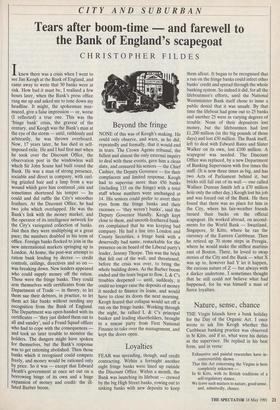CITY AND SUBURBAN
Tears after boom-time — and farewell to the Bank of England's scapegoat
CHRISTOPHER FILDES
Iknew there was a crisis when I went to see Jim Keogh at the Bank of England, and came away to write that 50 banks were at risk. How bad it must be, I realised a few hours later, when the Bank's press office rang me up and asked me to tone down my headline. It might, the spokesman mur- mured, give a false impression — or, worse (I reflected) a true one. This was the `fringe bank' crisis, the gravest of the century, and Keogh was the Bank's man at the eye of the storm — until, ruthlessly and arbitrarily, he was thrown overboard. Now, 17 years later, he has died in self- imposed exile. He and I had first met when he took over the Discount Office, the observation post in the windowless wall which Sir John Soane had built round the Bank. He was a man of strong presence, sociable and direct in company, with curl- ing grizzled hair and a limp from a war wound which gave him continual pain and sometimes shortened his temper — he could and did ruffle the City's smoother feathers. At the Discount Office, he had two jobs which overlapped. He was the Bank's link with the money market, and the operator of its intelligence network for the City's variegated collection of banks. Just then they were multiplying at a great pace; the numbers doubled in his term of office. Foreign banks flocked to join in the new international markets springing up in London. At home, the post-war attempt to ration bank lending by decree — credit controls, ceilings, directives and so on was breaking down. New lenders appeared who could supply money off the ration. These were the fringe banks. They could arm themselves with certificates from the Department of Trade — in theory, to let them sue their debtors, in practice, to let them act like banks without needing any recognition from the Bank of England. The Department was open-handed with its certificates — 'they just dished them out to all and sundry', said a Fraud Squad officer who had to cope with the consequences and took no later trouble to monitor the holders. The dangers might have spoken for themselves, but the Bank's response was to get rationing abolished. Then those banks which it recognised could compete freely, and money would be rationed only by price. So it was — except that Edward Heath's government at once set out on a borrowing binge of its own and a huge expansion of money and credit: the ill- fated Barber boom.


























































 Previous page
Previous page